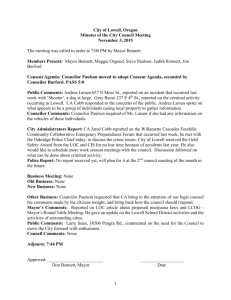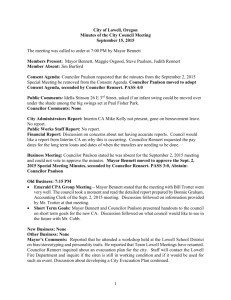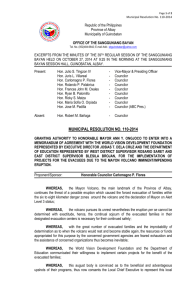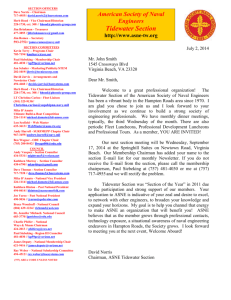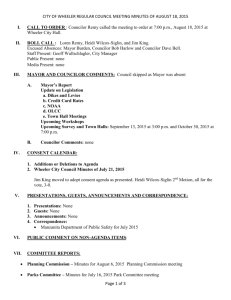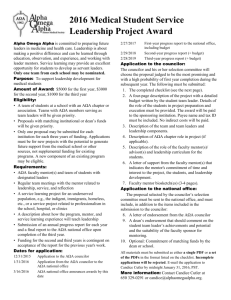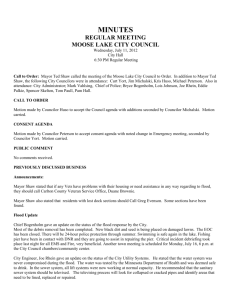Amended Faculty Assembly Bylaws (Effective on a pilot basis from Sep
advertisement
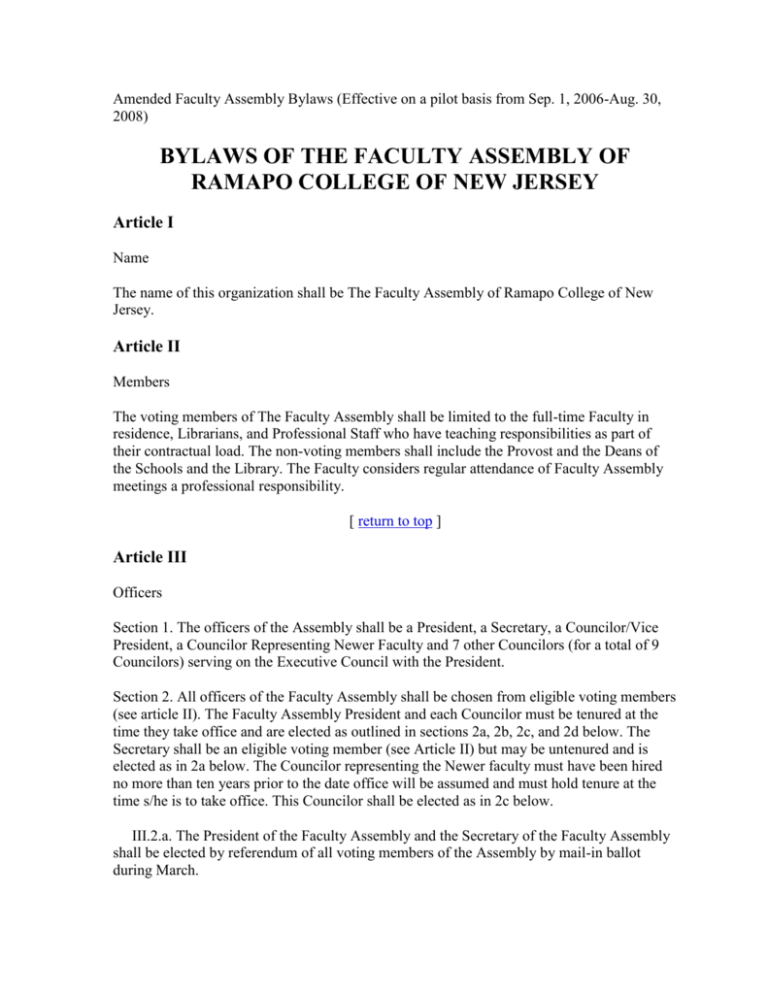
Amended Faculty Assembly Bylaws (Effective on a pilot basis from Sep. 1, 2006-Aug. 30, 2008) BYLAWS OF THE FACULTY ASSEMBLY OF RAMAPO COLLEGE OF NEW JERSEY Article I Name The name of this organization shall be The Faculty Assembly of Ramapo College of New Jersey. Article II Members The voting members of The Faculty Assembly shall be limited to the full-time Faculty in residence, Librarians, and Professional Staff who have teaching responsibilities as part of their contractual load. The non-voting members shall include the Provost and the Deans of the Schools and the Library. The Faculty considers regular attendance of Faculty Assembly meetings a professional responsibility. [ return to top ] Article III Officers Section 1. The officers of the Assembly shall be a President, a Secretary, a Councilor/Vice President, a Councilor Representing Newer Faculty and 7 other Councilors (for a total of 9 Councilors) serving on the Executive Council with the President. Section 2. All officers of the Faculty Assembly shall be chosen from eligible voting members (see article II). The Faculty Assembly President and each Councilor must be tenured at the time they take office and are elected as outlined in sections 2a, 2b, 2c, and 2d below. The Secretary shall be an eligible voting member (see Article II) but may be untenured and is elected as in 2a below. The Councilor representing the Newer faculty must have been hired no more than ten years prior to the date office will be assumed and must hold tenure at the time s/he is to take office. This Councilor shall be elected as in 2c below. III.2.a. The President of the Faculty Assembly and the Secretary of the Faculty Assembly shall be elected by referendum of all voting members of the Assembly by mail-in ballot during March. III.2.b. Two Councilors At Large shall be elected by referendum of all voting members of the Assembly. Such referendum shall be conducted by mail-in ballot during March. III.2.c. The Councilor Representing Newer Faculty shall be elected by a referendum of only those eligible members of Faculty Assembly who have been hired within ten years of the date the Councilor is to assume office (i.e. the September following the election). The election shall be by mail-in ballot conducted in March. (e.g. for the March 2006 election eligible voters will have been hired at Ramapo College no earlier than Sep. 1996). Note: In the event that the newer faculty do not select a Councilor Representing Newer Faculty that Council seat shall remain open until the next year¹s election. III.2.d. Each School and the library shall elect a Councilor/Unit Representative to sit on the Executive Council. Following announcement of the results of that year's at-large elections, nominations/self-nominations for open Councilor/Unit Representative seats shall be sent to the Faculty Assembly Secretary who shall verify eligibility and assemble lists of unit candidates. The Secretary shall advise the Dean of the School or the Library of the list of candidates by the first week of April. Units are to conduct their elections by secret ballot and report the results to the Faculty Assembly secretary by May 15. III.2.e. By early September, the new Executive Council shall elect from among its members the Councilor/Vice President who shall serve for a one year term running from that September through the following August. Section 3. Terms of office for officers of the Assembly are as follows: III.3.a. Terms of office shall run from Sep. 1 through Aug. 31. III.3.b. The President and Secretary are elected for two-year terms. The Councilor/Vice President and Councilor Representing Newer Faculty serve one-year terms. All other Councilors serve two-year terms. III.3.c. The Councilor/Vice President may be elected for a second consecutive term of one-year as long as s/he is still hir two year term as Councilor or has been returned for a second two-year term as a Councilor. The Councilor Representing Newer Faculty may run for a second consecutive term of one-year as long as s/he has been at Ramapo ten years or less at the time the second term is to begin. All other officers may stand for election to a second two-year term. III.3.d. No Councilor may serve more than two consecutive terms. Note: service on the Council whether as Councilor at Large, Councilor Unit Rep, or Councilor Representing Newer Faculty will all be counted toward the two term limit. III.3.e. The Faculty Assembly President is permitted to have served as a Councilor prior to election or to run for a Councilor position following the completion of the terms as President. Section 4. No more than one Councilor At Large may be from the same unit. Section 5: Should a Councilor-at-Large or the Councilor Representing Newer Faculty be unable to complete the term the seat will remain vacant until the next regular spring election and then a vote will be taken by the responsible constituency to replace the Councilor. Should a Unit/Unit Representative be unable to complete hir term the Unit will be asked to select a replacement at the earliest opportunity. A councilor who does not attend four consecutive weekly meetings is considered to have resigned his/her position, and will be replaced. Section 6. The Councilor/Vice President shall serve as President Pro Tem if the President is unavailable. Should the President be unable to complete hir term the Councilor/Vice President shall assume the duties of the President for the remainder of the semester. Immediate arrangements shall be made to hold an election to name a new President to take office with the subsequent semester. The new President shall serve a full two-year term. (Note: If the election must occur during the fall semester the new President will be elected to 2 1/2 year term in order to restore the regular election calendar as soon as possible.) Other duties of the Councilor/Vice President are listed below in Article V. Section 7. Compensation The Faculty Assembly President shall be granted the equivalent of half a teaching load plus the flex unit and a summer stipend. The Councilor/Vice President shall be granted the equivalent of one course release time per year plus the flex unit. The remaining Councilors and the Faculty Assembly Secretary shall be allowed to apply their service to the flex unit or (if the flex unit has already been approved for some other activity) shall receive overload compensation for their service to the Council. [ return to top ] Article IV Section 1: Meetings of the Assembly IV.1.a. The Assembly shall meet a minimum of two (2) times every academic semester. The date for the regular meetings will be decided by the President of the Faculty Assembly in consultation with the Executive Council. The dates shall be published together with the academic meeting calendar of the College. IV. 1.b. The President of the Faculty Assembly with agreement from the Executive Council -- may call, when necessary, special Faculty Assembly meetings. Such meetings may also be called by petition to the President from twenty faculty (from no less than three academic units or divisions). If a regularly scheduled meeting of the Faculty Assembly is deemed not necessary (for lack of agenda items) by the President of the Faculty Assembly and the Executive Council, it may be canceled and members notified at least two days in advance. IV.1.c. A quorum of the Faculty Assembly shall consist of one-quarter of the full-time voting members in residence. Section 2: Functions and meetings of The Executive Council IV.2.a. The Executive Council serves as a representative faculty voice. IV.2.b. The Faculty Assembly President shall chair the Council but shall be bound by plurality votes of the full Council. IV.2.c. The Council will consider matters of interest or concern to the faculty raised by the Faculty Assembly President, by Council members, or directed to the Council by members of the Faculty Assembly, deans, or other administrators, or other members of the Ramapo community. The Council will make one of the following determinations/dispositions of the matter: decline, handle, interface, assign, refer, send back, or prepare for Faculty Assembly. Parts 1-7 define each of these dispositions: IV.2.c.1. Decline: The Council determines that the matter is not appropriate for Executive Council or Faculty Assembly review and deliberations (although it may be forwarded to some other body at the college such as the American Federation of Teachers). IV.2.c.2. Handle: The Council determines that the matter is relatively straightforward and can be deliberated on and voted on by the Executive Council (e.g. location of the faculty dining room). IV.2.c.3. Interface: The Council brings the matter to a discussion with the responsible arm of the college (e.g. Student Affairs or Facilities) requesting information, clarification, or some specific action. IV.2.c.4. Assign: The Council determines that the matter is within the regular purview of the Faculty Assembly's standing committee (Academic Review Committee) or other regularly functioning committees such as the Sustainability Buildings and Grounds Committee or the Teaching and Learning Technology Roundtable) and will be forwarded to them for analysis. In such cases the Executive Council will request that committee indicate anticipated deadline for completion/decision. IV.2.c.5. Refer: The Council determines that the matter (due to size, complexity, etc.) needs the work and analysis of a specially designated group (task force, study group, subcommittee of the Council, etc.) before it can be deliberated on by the Council or by the full Faculty Assembly. In such cases the Council will empower an appropriate group and prepare a charge and a tentative timeline for the group to report back to the Council. IV.2.c.6. Send back: The Council determines that the issue requires further clarification, information, answers etc. and sends it back to the originator for further analysis and development. IV.2.c.7. Prepare for Faculty Assembly: The Council determines that the matter is of a substantive nature requiring the consideration, deliberation, and vote of the full assembly. In that case the Council will prepare the issue for agendaing for the Assembly meeting and will send it forward with a position of the Council on the matter indicated. Where there is a strong disagreement among Councilors on the matter, the dissenting Councilors can prepare a minority report which will be presented by one of the dissenting councilors at the time the majority position is presented to the Faculty Assembly. IV.2.d. The Council will maintain a record of issues and their dispositions on an ongoing basis and will post this record along with the agenda for each Faculty Assembly at least one week in advance of the Assembly meeting. Issues which have been declined (2c1) or handled (2c2) may be protested by following the procedure below in Article IV Section 2 Item 2n. IV.2.e. The Council will collaborate with the Faculty Assembly President in setting the agenda for Faculty Assembly. IV.2.f. The Executive Council shall meet weekly throughout the academic year and the agenda of the Council meetings shall be posted in advance. Voting members of the meeting shall be the Faculty Assembly President, the Councilor/Vice President, and the Councilors. Also present but as non-voting ex officio members shall be the Faculty Assembly Secretary (who will maintain the minutes of the meetings) and a representative designated by the Academic Review Committee who shall serve as liaison between the Executive Council and the Academic Review Committee. Others may be invited for particular meetings at the will of the Council. IV.2.g. Executive Council will maintain communication and contact with other college consituencies and groups including Student Government Association, Professional Staff Association, the American Federation of Teachers, etc. IV.2.h. The President of the Faculty Assembly may call, when necessary, special Executive Council meetings. Special meetings may also be called by petition of four (4) Councilors. If a regularly scheduled meeting of the Executive Council is deemed not necessary (for lack of agenda items) by the Faculty Assembly President (in consultation with the Councilor/Vice President) ithe meeting may be canceled and members notified at least two days in advance. IV.2.i. In the course of its regular weekly meetings, the The Executive Council will meet at least once a month throughout the academic year with the President of the College and at least once a month throughout the academic year with the Provost IV.2.j. Meetings of the Executive Council shall be closed except by invitation but minutes shall be maintained by the Secretary and posted electronically within a week of the acceptance of the minutes at the subsequent meeting. Councilor/Unit Representatives shall also report to and solicit input from their Unit Councils on a regular basis. IV.2k. A quorum for a vote will be six voting members of the council including the Faculty Assembly President and/or the Councilor/Vice President. IV.2.l. A majority vote of the Executive Council carries the motion. A tie vote on the motion means that the motion fails. IV.2.m. The Faculty Assembly general membership may overturn a decision made by the Council. In order to do so, the procedure in item IV.2.n. (next) must be followed. IV.2.n. A petition of 20 faculty members from at least three schools or the library can move any item which had been declined or handled (see Article IV Section 2 Item 2C 1 and 2) by the Executive Council onto the agenda for discussion at a full Faculty Assembly meeting. In that case, a majority vote of the Faculty Assembly would reverse a decision made by the Executive Council. The petition must be submitted within 60 days of the posting of the Executive Council report. [ return to top ] Article V Duties of the Officers Section 1: The Faculty Assembly President: V.1.a. Chairs the Faculty Assembly meetings and the Executive Council meetings; V.1.b. Prepares Assembly agenda with agreement of the Executive Council; V.1.c. Develops the academic meeting schedule in consultation with appropriate academic offices; V.1.d. Establishes ad-hoc faculty committees with approval of the Executive Council and fills the membership by a referendum of the voting members of the Faculty Assembly; V.1.e. Ensures the completion of assigned work/tasks by faculty committees, task forces, and study groups; V.1.f. Delivers an annual charge to the Standing Committees of the Assembly and requests the Executive Council to identify a formal liaison with those Committees; V.1.g. Meets weekly with the Executive Council V.1.h. Meets biweekly with the President of the College and sits as a member of the President's Cabinet; V.1.i. Meets biweekly with the Provost and sits as a member of the Provost¹s Cabinet; V.1.j. Serves as liaison with the College's Board of Trustees and reports regularly at Board meetings; V.1.k. Serves as liaison with elected faculty representatives to Board of Trustees Committees V.1.l. The Faculty Assembly President, in consultation with the Executive Council, will formally report to the Provost on any resolution taken by the Faculty Assembly which requires decisions and/or implementation beyond the assembly body. i.e. these would include curriculum changes, academic policies changes, recommendations re: capital improvements, but would not include internal matters such as the establishment of a faculty assembly committee or an expression of faculty opinions such as a resolution regarding academic freedom. The Faculty Assembly President will also report on decisions handled by the Executive council (noting the decision as tentative until the 60 day review period (see Article IV Section 2 n.) has expired. Section 2: The Councilor/Vice President: V.2.a. Assists the Faculty Assembly President in the completion of duties, including serving on committees as delegated appropriately by the Faculty Assembly President. V.2.b. Serves as Acting Faculty Assembly President in the absence of the Faculty Assembly President including (as needed) chairing Executive Council meetings, Faculty Assembly meetings, and attending and reporting at Board of Trustees meetings. Section 3: The Faculty Assembly Secretary: V.3.a. Sits as a non-voting member with the Executive Council for all regular meetings. V.3.b. Maintains minutes of decisions made at Executive Council meetings and at Faculty Assembly Meetings. V.3.c. Posts draft minutes at least one week in advance of the next Faculty Assembly. V.3.d. Posts approved Exexutive Council and Faculty Assembly minutes within a week following their approval V.3.e. Assists Faculty Assembly President in overseeing and counting all mail ballots other than an election involving hirself. Section 4: The Councilors: V.4.a. Serve on the Executive Council (see Article IV Section 2) and attends regular weekly meetings V.4.b. Regularly consult with and report to the relevant constituencies, i.e. Councilor/Unit Reps with their respective units; Councilor Representing Newer Faculty with the Newer Faculty V.4.c. Perform additional duties as deemed necessary by the Executive Council in consultation with the Faculty Assembly President. V.4.d. Collaborates with the Faculty Assembly President on setting the agenda for the Faculty Assembly meetings . V.4.e. Decides with the Faculty Assembly President on policy options or the need for task forces, study groups or special committees. [ return to top ] Article VI Committees Section 1. The standing committee of the Faculty Assembly shall be: The Academic Review Committee 1. The Committee - The Academic Review Committee reports to the Faculty Assembly on issues of academic policy and curriculum. It works most immediately with Convening Groups. It is charged to strengthen the autonomy of Convening Groups within the context of all-college accountability. Authority - The Committee is a standing committee of the Faculty Assembly. a. Name - The Committee is named the Academic Review Committee (ARC). b. Membership - The Committee is composed of six members, one from each of the five Schools of the College and from the Library. Members are elected by their respective units. Each unit shall nominate a minimum of two candidates and select by written ballot one faculty to serve on the committee. Membership is limited to full-time, tenured faculty and librarians. c. Terms of Office - Members serve for a term of two years. Members are limited to no more than two consecutive terms. Voting ö Decisions are made by a plurality vote of the Committee. A tie will be considered a negative vote. d. Meetings - The Committee will meet weekly as a general rule. Frequency may be regulated by the Committee at its own discretion. Four members constitute a quorum. 2. The Chair a. Eligibility for Office - The Chair will be selected by a plurality of the Committee b. Functions - The Chair schedules and presides at meetings, proposes agenda items for Committee approval, reports the findings of the Committee to the Faculty Assembly, and serves in other capacities when designated by the Committee. In the absence of the Chair, the Committee will appoint an acting chair. 3. Functions The Committee shall establish and publish academic and curricular guidelines, subject to approval by the Faculty Assembly and appropriate Administrative Officers. In the normal course of events, the Committee shall review academic policies and initiatives, approve courses and programs, and evaluate the integrity of the Gen Ed program and Senior Seminars. Reports will be presented regularly to the Faculty Assembly during the Academic Year. 4. Code of Conduct a. The Chair will ensure that minutes and attendance at every meeting are posted on the Faculty Web Site in a timely manner. b. The Chair or any other member of the Committee may be removed if the Committee deems that performance, attendance or professional conduct is problematic. A motion to remove the chair or a committee member must be approved by at least four committee members. c. A member may be recused from voting when, in the judgment of the committee, there is a conflict of interest. d. The Chair will meet with the Provost and the Faculty Assembly President whenever such a meeting is in their mutual interest. e. The Chair will specify, in writing, for faculty the concerns and reasons for acceptance or rejection of all proposals. This shall be done in a timely manner. f. Aggrieved faculty and staff may appeal to the Committee in writing or in person. The appeal may be pursued beyond the Academic Review Committee in the regular process for administrative review. 5. Remuneration a. The Chair of the Committee will be compensated, according to rank, the equivalent of six credits per annum. Other members of the Committee will be compensated, according to rank, the equivalent of four credits per annum. Compensation may be taken, if preferred, in released time. b. ARC Report on Academic Life The Chair of the Committee or a suitable delegate must report annually to the Faculty Assembly, in writing, and be subject to questioning. This report will have been approved by majority vote of the Committee members. The ARC Report on Academic Life will review the work of the academic year in question, explain and justify decisions, and point to new initiatives and on-going concerns. c. Structure and Process The process for approval of new proposals will not be essentially different from our present procedures. Steps for Approval of New Courses, Programs or Academic Policy Faculty Proposal for Course, Program or Policy Convening Group(s) or Other Appropriate Group Approval School Approval Academic Review Committee Approval (acting in place of former Academic, Curriculum, Gen Ed, Senior Seminar) Faculty Assembly Approval Section 3: Members of the Faculty Assembly serving on All-College committees shall report regularly by electronically posted reports on relevant issues or activities at Assembly meetings. Oral reports at the Assembly meeting will ordinarily only be made when an item is coming as a decision item to the floor. A request to make an oral report other than for a decision item must be brought (with its justification) to the Executive Council at least one week in advance of the Faculty Assembly meeting. [ return to top ] Article VII Section 1. The rules contained in the latest edition of Robert's Rules of Order shall govern the Assembly and the Executive Council in all cases to which they are applicable and in which they are not inconsistent with these bylaws and any special rules of order the Assembly may adopt. Section 2. The Parliamentarian shall be appointed by the President of the Faculty Assembly from among the voting members of the Executive Council to serve for a two year term. If the Parliamentarian is asked to rule on a question of process at Faculty Assembly or in the Executive Council the decision made by the Parliamentarian shall be final. In the absence of the Parliamentarian, the Faculty Assembly President may designate an emergency substitute. Section 3. Resolutions to be voted upon by the full Faculty Assembly must be accompanied by a written statement of explanation and must be approved by the President and the Executive Council at least one week prior to the Assembly meeting. An emergency resolution may be brought the Executive Council meeting on the morning of a Faculty Assembly meeting. The Council will determine if it may be added to the day's agenda as an emergency agenda item or disposed of in the usual way as in IV.2.c. Section 4. The only resolutions which may be introduced at the general Faculty Assembly meeting are those which specifically relate to the decision item before the body (i.e. a motion to table, an amendment to the motion, etc.) Section 5. In process of debate, speakers (not including persons presenting a report) are limited to no more than two statements on any one motion, and no statement may exceed three minutes. Section 6. A motion to table a decision item to the next Faculty Assembly meeting must pass by a majority. A motion to table a decision item for any period of time longer than the next Faculty Assembly meeting must pass by a 2/3 majority. In all other respects motions to table of any kind will be in accord with Robert's Rules of Order. [ return to top ] Article VIII Amendment of Bylaws These bylaws can be amended by a two-thirds vote of the full membership submitted by mail-in ballot , provided that the amendment has been submitted in writing at the previous meeting. Note: The bylaws can be temporarily amended for the length of a particular faculty assembly meeting by a motion on the floor passed by a 2/3 majority. This amended version of the bylaws is to be in effect as a pilot from Sep. 1, 2006 through Aug. 31, 2008. The governance structure provided by these bylaws will be assessed during February 2008 and a vote will be taken in March 2008 on whether to make this version of the Faculty Assembly bylaws permanent. The vote must pass by a two-thirds majority. Failing that the bylaws in effect in Fall 2005 will resume effect. [ return to top ] Article IX Adoption of Bylaws Adoption of amendments to the bylaws will be adopted upon a majority, i.e. two-thirds vote of the voting members in residence. [ return to top ]
